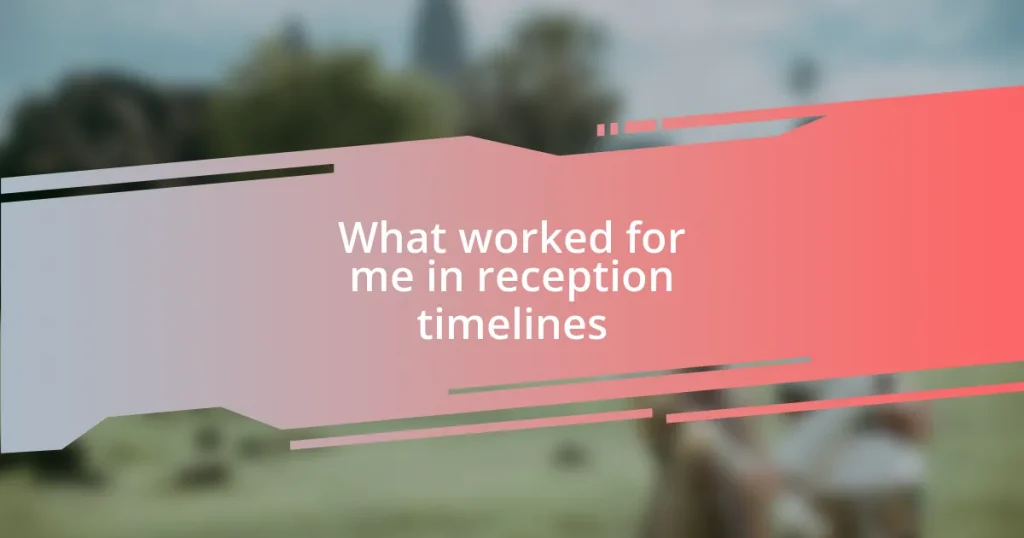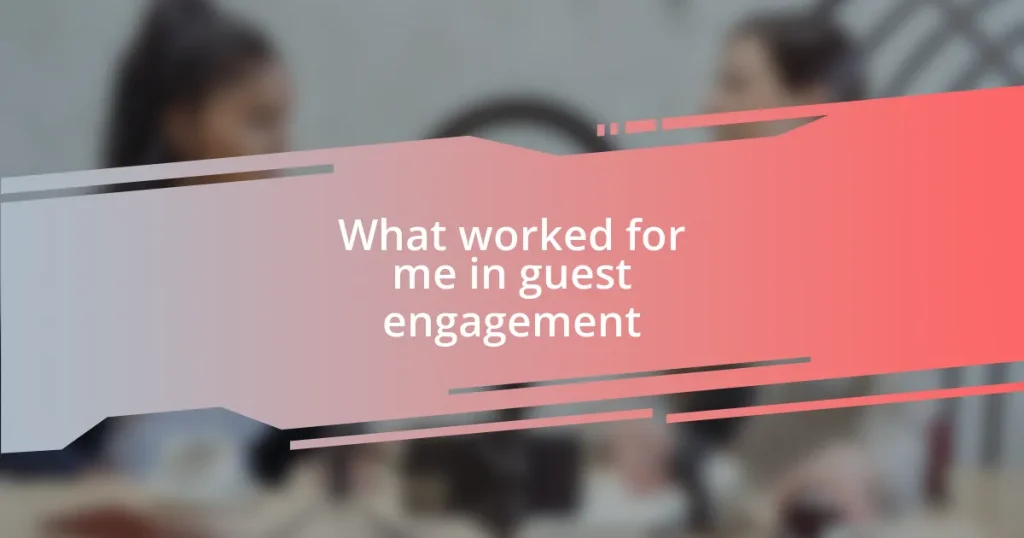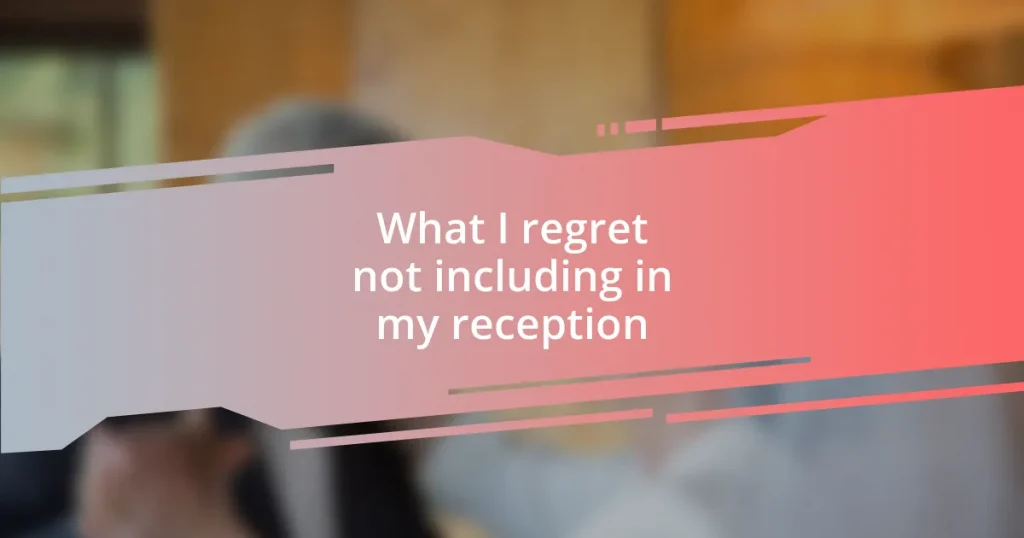Key takeaways:
- Personal interactions and recommendations are vital for identifying reliable local vendors, often revealing more than online reviews.
- Effective communication fosters trust and collaboration; strategies include using multiple platforms and encouraging feedback.
- Negotiating fair terms involves transparency and understanding both parties’ constraints, creating a partnership rather than a transaction.
- Evaluating vendor performance through structured feedback and informal discussions enhances relationships and encourages continuous improvement.

Identifying Reliable Local Vendors
When I first started searching for local vendors, I realized how crucial it was to check their reputations. One time, I contacted a vendor who had glowing online reviews, but when I talked to them, their customer service was lackluster at best. It made me wonder: how much weight should we really give to online ratings? With my experience, I learned that a personal touch can often reveal much more about a vendor than a handful of stars ever could.
Another key factor for me has always been recommendations from trusted sources. I remember needing a caterer for an event and reaching out to friends who had previously worked with local vendors. Their firsthand experiences led me to a fantastic option I might have overlooked otherwise. Isn’t it fascinating how human connections can often guide us to the best choices?
During my search, I’ve found that visiting a vendor’s location offers deeper insights into their operation. The atmosphere and overall professionalism can be telling; one look at a clean, organized space versus a cluttered, chaotic one often speaks volumes. Have you ever walked into a shop and felt whether or not they took pride in their work? That gut feeling can be just as important as what’s listed on their contracts.

Establishing Effective Communication Channels
Establishing effective communication channels with local vendors has been a game changer for me. In one memorable instance, I had a last-minute request for flowers for an event. Collaborating closely with the florist made all the difference. I didn’t just tell them what I wanted; I listened to their suggestions, which not only built rapport but also created a shared vision. This level of communication fostered trust, ensuring that our interactions were smooth and productive.
To enhance communication with local vendors, consider these strategies:
- Utilize Multiple Platforms: Don’t hesitate to reach out via phone, email, or even social media to find what works best.
- Schedule Regular Check-ins: Brief updates help avoid misunderstandings and keep everyone on track.
- Encourage Feedback: Create an open environment where both parties can voice thoughts and concerns.
- Be Clear and Concise: Clearly outline expectations to prevent any confusion down the line.
- Show Appreciation: A simple thank-you can cultivate goodwill and encourage further collaboration.
By utilizing these strategies, I’ve noticed that vendors are more eager to collaborate, leading to better outcomes.

Building Strong Collaborative Relationships
Building strong collaborative relationships with local vendors has always been a priority for me. I vividly recall working with a local bakery for an event I was organizing. Instead of just placing an order, I took the time to visit the bakery and chat with the owner. We shared stories about our passions, and suddenly, it felt less like a business transaction and more like a partnership. That connection not only made the experience enjoyable but also resulted in a beautifully crafted cake that exceeded my expectations. Isn’t it amazing how genuine conversations can transform a simple order into something special?
I’ve learned that mutual respect is essential when fostering these relationships. I remember a time when a vendor faced unexpected challenges the day before my event. Rather than panicking, I reached out understandingly, acknowledging their effort and challenges. This approach sparked an open dialogue where we brainstormed alternatives together, and we ended up creating a solution that satisfied everyone involved. This experience taught me that when you treat vendors as partners rather than mere suppliers, it nurtures a supportive environment that benefits both parties.
Trust also plays a significant role in building strong relationships. When working with a local florist on a repeat basis, I always made sure to honor our commitments. Once, I was late with a payment after a hectic week, and instead of reprimanding me, the florist simply reached out to remind me, asserting how much our partnership meant to them. I felt their goodwill, which only deepened my respect and commitment. This taught me that showing integrity can truly create a bond that withstands the test of time.
| Key Aspect | Personal Insight |
|---|---|
| Effective Communication | Listening to suggestions builds trust. |
| Mutual Respect | Understanding vendor challenges fosters collaboration. |
| Trust | Honoring commitments deepens relationships. |

Negotiating Fair Terms and Pricing
Negotiating fair terms and pricing with local vendors can significantly influence the success of any collaboration. I remember getting a quote that felt a bit inflated while planning an event. Rather than just accepting it, I asked the vendor to explain their pricing structure. It turned out they had accounted for premium materials that I hadn’t specified. By discussing my budget openly, we arrived at a more fitting option without compromising quality. Isn’t it empowering to find a solution together?
In my experience, transparency is key to negotiations. One time, I worked with a local caterer who initially presented a higher price than expected. I calmly shared my budget constraints and explained the essential elements I couldn’t sacrifice. To my surprise, they offered alternative options that maintained the event’s integrity while accommodating my budget. It felt like a true partnership, demonstrating that negotiation isn’t a battle but rather a conversation that can lead to creative solutions.
Establishing something beyond the basics, like a goodwill gesture, can strengthen these negotiations. For instance, when I agreed to a long-term partnership with a vendor, I made it a point to offer consistent business in exchange for discounts or perks over time. The relationship we developed turned negotiation from a one-time discussion into a collaborative effort that benefited both parties, nurturing trust and respect. Don’t you think these kinds of agreements make working together much more enjoyable?

Managing Expectations and Deliverables
Managing expectations with local vendors can be a delicate dance, and I’ve learned it requires careful communication. For example, during one event, I needed a vendor to provide a specific item on a tight timeline. I outlined my expectations clearly and confirmed their ability to meet the deadline. This direct approach not only helped them understand my urgency but also encouraged them to communicate any potential issues early on. It made all the difference in ensuring everyone was on the same page. Have you ever faced a similar situation where clarity made a big impact?
When it comes to deliverables, I’ve found that setting realistic timelines is crucial. There was a time when I assumed a vendor could handle a last-minute request while juggling multiple projects. I quickly realized that my urgency didn’t align with their workload. It was a wake-up call! I shifted my approach, learning to break down larger tasks into smaller, manageable milestones. This small change alleviated pressure and fostered a sense of shared responsibility, making it easier for both of us to navigate challenges. Doesn’t it feel good to have a plan that respects everyone’s commitments?
Evaluating deliverables is another essential layer in this process. I once worked with a graphic designer who delivered an initial draft that didn’t quite meet my vision. Rather than expressing disappointment, I took the time to provide constructive feedback, sharing what excited me about their work and what I hoped to see refined. This open dialogue transformed our collaboration. The designer felt valued and motivated to elevate their creation, ultimately leading to a final product that we both loved. Isn’t it fascinating how feedback, when delivered thoughtfully, can enhance creativity and satisfaction?

Evaluating Vendor Performance and Feedback
To properly evaluate vendor performance, I rely on a structured feedback process. During one project, I created a simple evaluation form to gather input from all parties involved. This included aspects like timeliness, quality, and communication skills. The results were eye-opening! I discovered some vendors exceeded expectations while others fell short in critical areas. Isn’t it enlightening to have data that illuminates the strengths and weaknesses of your partnerships?
In addition to formal evaluations, I’ve learned the importance of informal feedback sessions. After an event, I invited a catering vendor to chat over coffee. This relaxed setting opened the door for candid conversations about our experiences. They shared insights on what went well and areas for improvement that I hadn’t considered. This type of dialogue builds rapport and helps both sides feel invested in the growth of the partnership. Have you noticed how much richer discussions can become in a more personal environment?
I also pay attention to post-project reflections. After collaborating with an event planner, I asked them for their thoughts on our teamwork. Their response revealed valuable lessons about our workflows and communication. It was a great reminder that evaluating vendor performance isn’t just about assessing them; it’s also a chance for self-reflection. How often do we take a moment to really analyze our own contributions? In my experience, this dual lens creates more meaningful relationships and continuous improvement on both sides.















